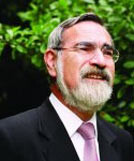The Electronic Intifada 7 March 2006
If the past few weeks have demonstrated anything, it is the frequency with which allegations of anti-semitism surface in modern political debate. Ken Livingstone, the Church of England and The Guardian (over articles comparing Israel and apartheid) are the most recent to find themselves in the firing line. This is the backdrop against which an unofficial parliamentary inquiry on anti-semitism under former Foreign Office minister Denis McShane concludes its hearings in Westminster today.

John Mann

George Will

Jonathan Sacks
There is no shortage of examples, from Karl Marx to George Orwell, of prominent leftwing figures making offensive remarks about Jews. Instances of anti-capitalism spilling into “rich Jew” bigotry are also well documented. More recently, Tam Dalyell blamed government support for Israel on “a cabal of Jewish advisers” - comments that were deservedly condemned.
But these personal expressions of prejudice stand out precisely because they conflict so sharply with the left’s universalism and its opposition to ethnic discrimination. A more sweeping charge is that this universalism is itself a source of anti-semitism since, in its maximalist interpretation, it denies Israel’s right to be a Jewish state. But the few still calling for a single “secular, democratic state” in the whole of historic Palestine are making a statement about the inadmissibility of defining statehood according to religious or ethnic criteria that they apply as a universal norm. Impractical and idealistic this may be, but it is not anti-semitic, and it is plainly dishonest to suggest it is.
In any case, this is a minority view on the left, and has been for a long time. Decolonisation forced the mainstream left to incorporate expressions of national and ethnic identity into its worldview. The reaction of the democratic left to Israel’s creation was largely positive as a result. It helped that Israel was governed from the left, but the example of a persecuted people creating a successful, independent state inspired a profound admiration for Zionism.
So what changed? The answer is 1967 and Israel’s subsequent emergence as a power determined to annex territory beyond its legally recognised borders. The unbearable truth is that the left that identifies with the Palestinians today is largely the same left that identified with Israel in the 50s and the 60s. Moreover, it does so for largely the same reason: instinctive sympathy for the underdog. For some, the idea that anyone could see the conflict in these terms is literally unthinkable, so they are forced to impute to Israel’s critics the motive of Jew-hatred.

Gold Meir
A more subtle argument accepts that Israel is open to criticism, but complains that it is singled out to an extent that reveals an underlying anti-Jewish prejudice. Or to put it another way: “Others get away with it, so why can’t Israel.” Despite its cynicism, this argument deserves an answer, and it is provided, as it happens, by Israel’s staunchest supporters. Israel, we are rightly reminded, is a democracy. Is it not legitimate, therefore, to expect it to uphold the democratic values we share in common? Far from being held to a higher standard, as its supporters often protest, Israel seems to operate with a greater impunity, and to do so with western acquiescence. This is the real reason why the issue is felt so deeply on the left and why unofficial boycotts are emerging to fill the moral void left by our feeble leaders.
A final objection takes issue with the left’s supposed “demonisation” of Israel. Although often overdone, one suspects that comparisons with apartheid provoke anger because they contain an uncomfortable element of truth. More clear-cut are analogies with Nazi Germany. These should be deplored on grounds of both historical truth and taste. But are they anti-semitic as opposed to just plain obnoxious? Those who resort to them know they are bogus, but they understand their shock value and hope to shame and anger Israel and its supporters into modifying their behaviour. Indeed, as a debating tactic, it is indistinguishable from the one deployed by those levelling charges of anti-semitism against the left. They do it not because they believe it, but because they know the left takes its anti-racism seriously and is susceptible to this kind of blackmail. There has been enough of this intellectual thuggery on both sides, and it’s time someone called a stop to it.
This is one way in which the report of the parliamentary inquiry could contribute something positive. Real anti-semitism is a serious and growing problem, and there is a need for political consensus about how to tackle it. But debate is poisoned and consensus becomes difficult when allegations of anti-semitism are bandied about for reasons that have nothing to do with fighting racism. An inquiry that wants to confront anti-semitism should also confront those who cheapen the term through reckless misuse.
David Clark is a former adviser to the British government. This article, which first appeared in The Guardian, is reproduced with permission of the author.

